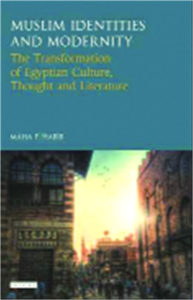
Muslim Identities and Modernity: The Transformation of Egyptian Culture, Thought and Literature
Maha Habib
I. B. Tauris (2016)
Rs12,013.50
What have the concepts of modernity and secularization meant for Islamic tradition, culture and society? How have the discourses which surround all of these issues influenced Muslim self-perception and individual identity? There have been many attempts to describe and analyse the encounter between Islam and modernity in the Middle East, but few have been able so effectively to explore the impact this has on the idea and reality of religious identity and individual religiosity. Maha F. Habib examines modernity from this angle, offering socio-cultural, philosophical and literary perspectives. She assesses how this is played out in Egypt, analysing cultural changes in the country through its intellectual thought and literature, from the nineteenth century to the present day. Her references to the works of Muhammad Abdu, Muhammad Husayn Haykal, ‘Abbas Mahmud al-’Aqqad, Naguib Mahfouz, Alaa al-Aswany and Salwa Bakr reveal contemporary issues and concerns which will interest those researching the cultural and social milieu of modern Egypt.
Maha F. Habib is a Lecturer at the University of Waterloo in Canada. Previously a Researcher at York University in Toronto, she holds a PhD in Arab and Middle Eastern Studies from the University of Exeter.
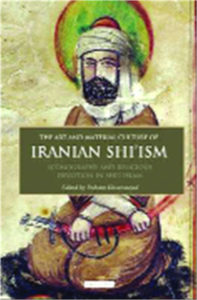
The Art and Material Culture of Iranian Shi’ism: Iconography and Religious Devotion in Shi’i Islam
Pedram Khosronejad
I. B. Tauris Ltd (2011)
Rs10,251.52
Shi’i Islam has been the official religion of Iran from the Safavids (1501-1732) to the present day. The Shi’i world experience has provided a rich artistic tradition, encompassing painting, sculpture and the production of artefacts and performance, which has helped to embed Shi’i identity in Iran as part of its national narrative. In what areas of material culture has Iranian Shi’ism manifested itself through objects or buildings that are unique within the overall culture of Islam? To what extent is the art and architecture of Iran from the Safavid period onwards identifiably Shi’i? What does this say about the relationship of nation, state and faith in Iran? Here, leading experts trace the material heritage of Iranian Shi’ism within each of its political, religious and cultural dimensions.
Pedram Khosronejad is Goli Rais Larizadeh Research Fellow at the School of Philosophical, Anthropological and Film Studies at the University of St Andrews.
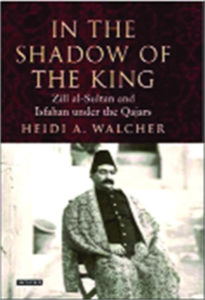
In the Shadow of the King: Zill al-Sultan and Isfahan under the Qajars Arash Khazeni
Heidi Walcher
I.B. Tauris (2008)
Rs12,013
Zill al-Sultan was the notorious Qajar prince who ruled Isfahan, Iran’s former capital during the Safavid era, as governor from 1874 to 1907. He is remembered as a Qajar anti-hero — even a villain — to this day, based largely on his apparent exercise of absolute power and pursuit of intrigue to further his own political interests. But late 19th-century Iran was a complex place: the Anglo-Russian great power rivalry, the assertive Shi’ite militancy of leading clerics, the growing power of the merchant classes, the entrenched and jealously guarded control of the landowners and tribal leaders, the halting attempts to reach out to modernity — all of these helped to create a climate of instability through which Zill al-Sultan navigated with almost Machiavellian skills and deft ruthlessness. Heidi Walcher has produced the first, extraordinarily important study which is both a biography of one of the most colorful individuals in the history of modern Iran and a study of the social and political circumstances of late 19th-century Iran. In the process she examines the difficult relationships between the secular and Islamic elites, the impact on Isfahan of the pivotal Tobacco Protests in 1890-92, the open trade wars against the British, suspicion of the Jews, the persecution of local Babis and Bahais, the confrontation with European missionaries and the events leading up to the Constitutional Revolution of 1906. This book is a major contribution to a proper understanding of modern Iran.
Heidi Walcher is Lecturer in History of the Middle East at SOAS.
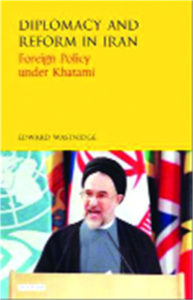
Diplomacy and Reform in Iran: Foreign Policy Under Khatami
Edward Wastnidge
I. B.Tauris & Co Ltd (2016)
Rs10,251.52
Nuclear power has for the most part dominated Western media and academic analyses concerning Iranian foreign policy in recent years. This focus, however, can be misleading, especially as regards the early presidency of Mohammad Khatami (1997-2005). In a riposte to Samuel Huntington’s ‘Clash of Civilisations’ theory, Khatami proposed that there ought to be a ‘Dialogue among Civilisations’. In this book, Edward Wastnidge examines Khatami’s proposition, derived from the contemporary Iranian polymath Dariush Shayegan, not as a philosophical suggestion, but as a real foreign policy tool that enabled Khatami to make overtures towards the US. Across bi-lateral and multi-lateral examples, he explores its specific application and how it was used to create foreign policy and aid diplomacy. Furthermore, by placing the development of the idea within Iran’s domestic political context, Wastnidge is also able to shed light onto the rise of the reform movement during this period. Based on extensive research, Diplomacy and Reform in Iran is a timely contribution to scholarship, and important reading for students and researchers of contemporary Iran and the complexities of Iranian foreign policy.
Edward Wastnidge is a Lecturer in Politics and International Studies at The Open University. He joined the department in 2013. Prior to this he held positions at Manchester Metropolitan University, Keele University and the University of Manchester. He also previously worked for the Open University as an Associate Lecturer. Edward is currently the Qualifications Director for the Open University’s International Studies programme.
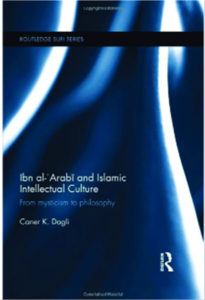
Ibn al-’Arabi and Islamic Intellectual Culture: From Mysticism to Philosophy
Caner K Dagli
Routledge (2016)
Rs14,416.20
Ibn al-’Arab? (d. 1240) was one of the towering figures of Islamic intellectual history, and among Sufis still bears the title of al-shaykh al-akbar, or “the greatest master.”
Ibn al-’Arab? and Islamic Intellectual Culture traces the history of the concept of “oneness of being” (wahdat al-wuj?d) in the school of Ibn al- ‘Arab?, in order to explore the relationship between mysticism and philosophy in Islamic intellectual life. It examines how the conceptual language used by early mystical writers became increasingly engaged over time with the broader Islamic intellectual culture, eventually becoming integrated with the latter’s common philosophical and theological vocabulary. It focuses on four successive generations of thinkers (Sadr al-D?n al-Q?naw?, Mu’ayyad al-D?n al-Jand?, ‘Abd al-Razz?q al-K?sh?n?, and D?w?d al-Qaysar?), and examines how these “philosopher-mystics” refined and developed the ideas of Ibn al-’Arab?. Through a close analysis of texts, the book clearly traces the crystallization of an influential school of thought in Islamic history and its place in the broader intellectual culture.
Offering an exploration of the development of Sufi expression and thought, this book will be a valuable resource for students and scholars of Islamic thought, philosophy, and mysticism.
Reviews: “He brings together a close reading of daunting primary sources with the findings of a wide range of specialists, demonstrating in the process his own impressive analytic and synthetic talents. With remarkable lucidity, he chisels away long, drawn out metaphysical arguments and gets to their heart in a few sentences.” (Atif Khail, Assoc. Prof., University of Lethbridge, Nazariyat Journal for the History of Islamic Philosophy and Sciences)
“Much more can be said about the significance of this study. The first three chapters are indispensable for the serious reader, as they offer a very nuanced and seasoned reading of Islamic metaphysics…” (Ramzi Taleb, University of Toronto, Journal of the Muhyiddin Ibn ‘Arabi Society)
Caner K. Dagli, Associate Professor of Religious Studies at the College of the Holy Cross, is a specialist in Sufism, Islamic philosophy, interfaith dialogue, and Quranic studies.

